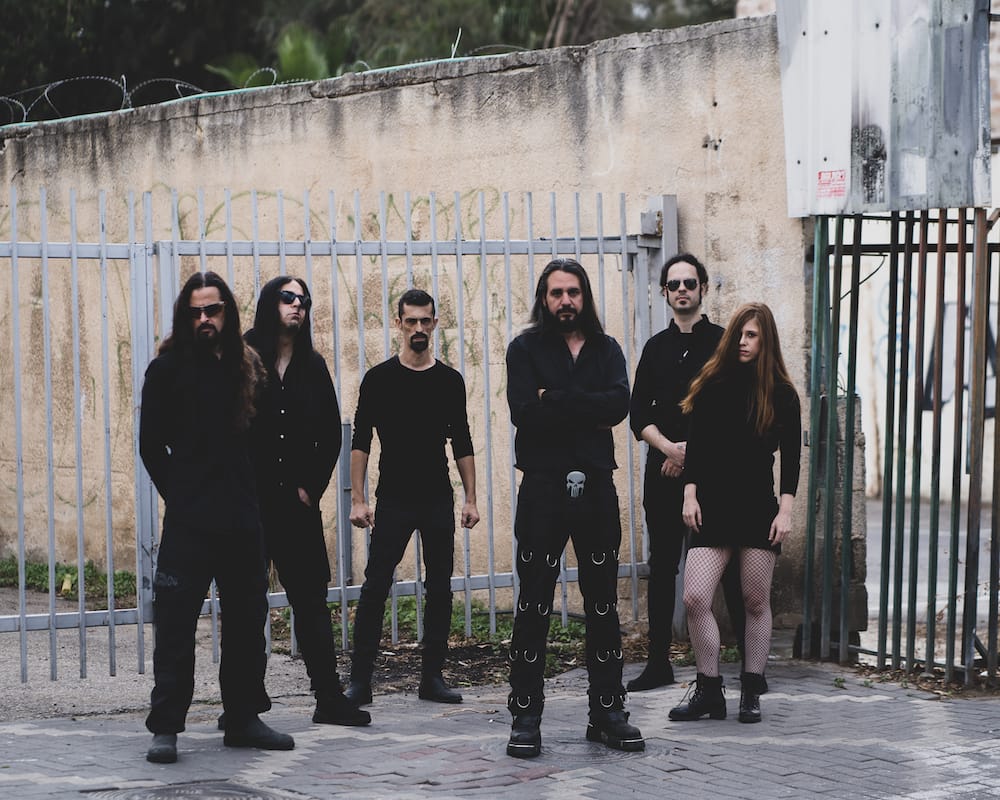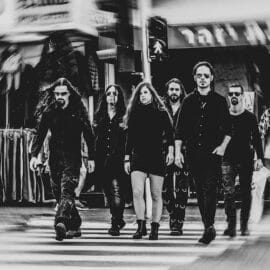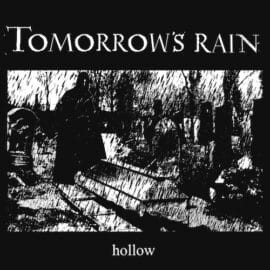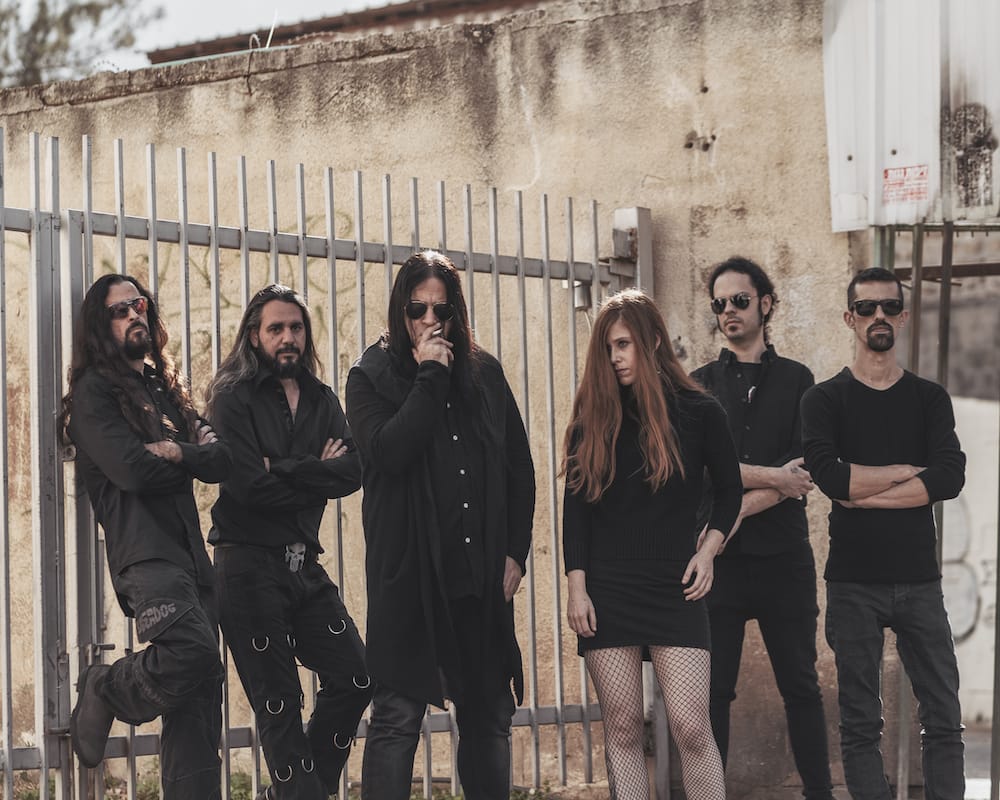Only 18 years after their foundation the Israeli death/doomers TOMORROW’S RAIN released their debut album „Hollow“. With their insanely large line-up of renowned guest musicians such as Greg Mackintosh (Paradise Lost) and Jeff Loomis (Arch Enemy), the record should, however, immediately attract a lot of attention. In our following interview, singer and band co-founder Yishai Sweartz explains among other things why the album was only completed after such a long time, why he doesn’t fear to be overshadowed by the big names of the guest musicians and whether the next release will be as long in coming.

Your band’s history goes back to 2002, when your name was still Moonskin. Why did you later on change your name to TOMORROW’S RAIN?
The reason it took so long and the name change case is in fact interesting: When we started (as Moonskin) back in 2002 the band was our savior, then we wrote a few songs, played a few shows, opened for Epica here in Tel Aviv, then we started to feel better in our lives, less depressed, less sadness, we both got married, and I felt like having my life goin‘ the right way, I felt much better and I felt I couldn’t go on stage singing these songs about my wounds and inner demons while getting married, about to become a father and feeling so much happier. It would have been fake, it would have been „work“, so I told Maor that I didn’t want to continue anymore as I didn’t want to fake it, it was a purely artistic way of thinking.
So we stopped around 2006.
In 2010 my life took a change again, I got divorced and had got 50 % custody which means that my kid is living with me 50 % and 50 % of the time with my ex. I felt so full of pain because of the end of this relationship and the only thing in my mind was to protect my kid, I was broken, my heart was „in pieces“. Then I turned to the best savior I know: music…
I called Rafael and gave him three words: „let’s do it“. That’s it, about a day later we were in the studio and shortly after we opened for Dark Tranquillity, changed the band’s name to TOMORROW’S RAIN and started to write the songs you hear now on the album. We felt that Moonskin represents the first years with a certain direction and we wanted a fresh start.
During the process I learned I can dance with my demons instead of ignoring them, I learned that by writing about these things I heal myself, I learn about myself, I touch the wound with a helping hand, so here we are…

With „Hollow“ you are just now releasing your debut. However, as mentioned, some of the songs on it were written many years ago. Why did it take you so long to finally finish the album and prepare the release?
I kinda answered most of the question in the previous answer… (laughs) You should consider, we had a lot of guest musicians here as well and also we recorded the whole album in hebrew too, so it was recording 16 songs with something like 20 people apart from the band members and we invested a lot of effort in the mixing process to get to the same result we wanted. It was a hell of a ride but we are happy.
The effects of the COVID 19 pandemic on the music industry are still being felt – concerts, for example, are still difficult or even impossible to realise. How has the whole situation affected TOMORROW’S RAIN?
No shows at the moment, of course, a sad situation, more than 25 % of the people in Israel are without a job now and sadly there is no support from the government at all, they just bullshit us all the time. So I don’t know when shows will be allowed again, you know, I have been a metal promoter too here for the last 20 years and I had to move or cancel all my shows one after the other, of course, it was a serious money loss.
On the other hand we have time to focus on the promotion, online work pushing the album etc etc.
When things will go back to normal we will start to plan the whole live situation, right now we face the unknown, sadly.
You mainly play death/doom with gothic influences. How did your enthusiasm for these genres start and what do you find particularly fascinating about them?
I grew up in the 80’s to the sound of The Cure, The Sisters Of Mercy, Joy Division, New Model Army and also Cocteau Twins, This Mortal Coil and of course Nick Cave, when I was 16 and I heard „Gothic“ by Paradise Lost and „Serenades“ by Anathema for the first time. I felt they combined the two worlds I loved, the metal world and the dark rock world, it was a huge influence.
Your influences like Paradise Lost, My Dying Bride or Katatonia can be heard very clearly in your music. Are there, however, also artists who inspired you in a less obvious way?
A list?… (laughs) The Cure, Morrissey, The Mission, Nick Cave, David Bowie, Bathory, early At The Gates, Dissection, Edge Of Sanity, Tiamat, Danzig, Mark Lanegan, Fields Of The Nephilim, The Sisters Of Mercy, Sol Invictus, Celtic Frost, Mercyful Fate, Type O Negative, The Cult etc etc.
 Basically there were and are many bands that play this kind of music. What is more important from your point of view: innovation or a solid sense of style?
Basically there were and are many bands that play this kind of music. What is more important from your point of view: innovation or a solid sense of style?
It was very important to me that the SONGS would be strong and convincing by themselves, even without the guests, that’s the most important thing in an album in my opinion: strong songs, guests can spice it up and add extra value, of course, but the songs have to stand strong to start with.
One of the most important things was to write songs and not to write riffs, to look into the whole picture, the whole „story“ and not like „it’s a great riff“, kind of.
So it was very, and I mean VERY important to me is that the songs stand strong even without any guest, that the album will not have any fillers, that the songs will be solid. You can bring Mick Jagger and Nick Cave to sing in your album but if the songs will be shitty it will never work, the songs have to be strong, and true, after all: People will stay with the songs and not with the names, if they love the songs they will keep on listening to them.
The most important thing is to sing your truth, authentic, real, open yourself, so the people can believe you, can feel you.
However, sometimes this mixture of gothic and doom metal is considered to be kitschy. What is the difference between kitschy and serious emotional music?
Every style can be kitschy, also heavy metal about the power of dragons and steel can be kitschy or hardcore about the tough guy crew or black metal with forests, synths etc etc. Even thrash or death metal can be like that when you hear the same clichés over and over again for 15 albums, so you will find it in every music style.
I know what we stand for and what an emotional and artistic depth we bring to the table, we are far away from that, we create art, not pop songs with distortion.
 Let’s talk about your debut: Already the songtitles show that the record deals with all kinds of oppressive topics. What life experiences have you processed in the songs?
Let’s talk about your debut: Already the songtitles show that the record deals with all kinds of oppressive topics. What life experiences have you processed in the songs?
„Hollow“ is a word that reflects the album, this album was written in times of despair, loss and a broken heart. The song is actually the last one written for the album and during the pre-production process I was thinking about a possible name to reflect it all. „Hollow“ felt right.
We all felt hollow during the years surrounding this record, my life was a hellish ride, other band members faced death in the family, broken homes, depression, crisis after crisis.
I only write about my own personal life. I am coming from a poetry background. I released a poems book back in 1993 called „Rage Prophet“ in Israel at the age of 18, so writing for me was always the way to express what I feel. I write songs since I was a kid, even when I write about Warrel Dane in „Into The Mouth Of Madness“ I write about my personal feelings through the last period of his life and the day he passed away. Digging through the album’s lyrics is a journey into my soul, but of course people take the song to the place they feel like and it’s great, it’s the strength of art if you ask me.
However, the lyrics in „Hollow“ is my life’s story, painful as it is, but it’s also a story about strength, about facing fears. Writing the songs for this album was a great tool with which to use this pain for a good and creative cause, and it’s more important than how many CDs you sell or how many tickets or t-shirts you sell, it’s the ability to wake up early in the morning without feeling panic attacks, without wanting to stay in bed for the rest of the day.
What will surely draw the attention of many metal fans to the album are the countless well-known guest musicians who contributed to it. How did you manage to get so many famous metal artists to contribute to the album?
The idea with the guests was to welcome them with open arms to our house and have each one of them to leave something of their own into our body of art. We thought about each part and gave each guest exactly the parts I thought fit them, for example, in „Misery Rain“ I almost had a spoken part, telling a very personal story and every time I sang it in the studio I thought: „It would be great to have Fernando from Moonspell doing this part in the same vibe he did similar parts in „Wolfheart““ which is an album I really really love, so I invited Fernando and he did that part. We invited Jeff Loomis for a song about Warrel Dane, Warrel was a friend of mine and in fact was supposed to produce „Hollow“, so inviting Jeff Loomis to play in this personal memorial song for his longtime friend and musical partner was a great idea, etc etc. I think you can easily recognize Greg Mackintosh’s special solo in „In The Corner Of A Dead End Street“ and the same goes for Aaron from My Dying Bride in „Fear“, they all gave me a small part of them and for this I will thank them forever.
Most of them are in fact friends that I have known for many years. I knew Sakis from Rotting Christ in 1993 and always kept in touch, so him and Rotting Christ are family to us. Also Anders from Draconian, Spiros from Septicflesh, Mikko from Swallow The Sun and, of course, Kobi from Orphaned Land have been friends for many years. Also Jeff Loomis, even though I got to know him personally only in 2003 or 2004, I think, but it’s 17 years, time flies fast. Paradise Lost played here many times and we opened for them twice and that’s how I got to know Greg personally. Aaron from My Dying Bride is in fact the only one I only got to know personally around two years ago but I am a huge My Dying Bride fan since 1991, so he was one of the persons I always wanted to work with and have him on the album. We did all the conversations via email but we wrote a lot to each other and not only about music, so he is definitely a person I consider a friend and it’s a great honor for us as a band to have him singing with us on the album.

How did you decide which guest musician should contribute what on which track?
Very simple: I’m a music fan and I imagined what and who I would like to hear and where.
Do you think that there is a risk that your own artistic achievement and identity might get lost between all these big names?
In fact its very simple: People will stay with the songs and not with the names, if they love the songs they will keep on listening to them, if they don’t like the songs no guests will help.
Which of the guest contributions are you personally especially proud of and why?
All of them, really, it’s not a competition. It’s art, it’s my life written there, my pain, my scars, my wounds, my hopes, I don’t sit at home and think like „Oh, that part of Fernando (Moonspell), is it better than the part of Sakis (Rotting Christ)?“ No, I never think like that, I rather think „It’s fucking amazing to have my Athenian brother and my brother from Lisbon to sing for me here on the album and give something from themselves.“ A small piece, as „Wolfheart“ and „Thy Mighty Contract“ are two of my top albums in the style, so it’s great, I’m a metal fan, a music fan and I’m hungry for creative experiments.
What will happen next with TOMORROW’S RAIN? Will you release new music sooner than you did with your debut?
Sure, already four new songs are written and I hope that a year from now the second album will be recorded and mixed.
Do you plan to work with many other artists in the future as well or do you want to concentrate more on yourself from now on?
“I don’t know where I’m going from here, but I promise it won’t be boring.” – David Bowie.
Finally I would like to go through a short brainstorming with you. What do you think of the following terms?
Best Peaceville Three band: My Dying Bride, Paradise Lost, Anathema
„Too many cooks spoil the broth“: Each case to it’s own.
Hope: What can we do in life without it? It’s everything.
Blast beats: Not really our style musically but as a person: Give me Immolation / Hate Eternal / Vader / Napalm Death and I can be happy for a few hours.
Nostalgia: I love it but only when it’s a tool to reshape our future.
Mainstream metal: what do you mean by mainstream metal? Mainstream as a result of the sales? Or mainstream as bands who try to go commercial more and more in purpose? In any case, to each his own, there are good bands everywhere.
Thanks again for your time. Is there anything else you would like to tell the readers at this point?
Thank you so much for the interview and for supporting us, good luck with the magazine and let’s hope things will be normal again, so we will be able to come and play shows in your country!
Dieses Interview wurde per E-Mail geführt.
Zur besseren Lesbarkeit wurden Smilies ersetzt.
